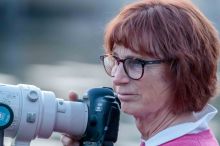As I come to the end of my MA course of study, I thought it might be useful to reflect on the overall experience and the Final Major Project. It seemed when I began the course that two years would be a long haul, but now looking back I am amazed at how quickly it went by. At the outset, I was a competent photographer but with no sense of what to do with my work and no real understanding of who I was as a photographer. I took photographs but had no real understanding of the discipline of photography and its history. I was in fact exceptionally naïve about what I was getting myself into at the outset of the course.
Thankfully, I was fortunate to be in a cohort with some extraordinary people who throughout the course have worked closely together challenging and mutually supporting each other. I can with complete confidence say that absent them this course would have been far less rewarding and I less successful. The Cromarty cohort was instrumental in not only filling the curricular gaps, but in adding to the discourse and pushing beyond the demands of the course. We were there for each other throughout to clarify, console, instruct, support and encourage. The overall experience was far richer because of them.
I leave the course with a strong sense of who I am as a photographer and a clear artistic voice and identifiable style to my work. I hadn’t anticipated how much my photographic skills would improve, but they have. More importantly, I have learned to tell stories visually, and am able to conceptualise and realise work with clear intentions. Sound and video recording and editing, sophisticated post-processing, book publication, exhibition design and curation, website design, blogging, and photographic printing are all now significant competencies. I have gone from being the totally naïve student to one who has become a mentor for others in the cohort and elsewhere. It is quite a remarkable evolution over the two years.
Each module of the course presented its own challenges. Positions and Practice required a lot of catching up on Information Technology skills as I had never blogged, built a website or used many of the software applications that would be essential to the course of study. And I struggled to find the point of critical theory and overly obfuscatory academic writing during that module.
In Surfaces and Strategies, I began to be more comfortable with the underlying infrastructural requirements (IT), and with the opportunities to tell stories and create publications began to hit my stride. The reading and critical theory explorations became more intelligible and relatable, and I began to truly enjoy the research. I was challenged to think in new ways about photography in general and my work specifically. I continued to expand my skill set by tackling programs like Adobe Premiere to do video editing and Bookwright for publications. I published my first book during this module.
Sustainable Prospects was something of a disappointment academically and fell far short of what it might have been, but it afforded me the time to expand my reading and research independently. It resulted in my being particularly well prepared for Informing Contexts.
In Informing Contexts not only had I come into my own academically, but it is in this module that I believe I found my artistic voice and developed a style that was uniquely mine. I came to understand who I was as photographer and how to fully conceptualise and realise a body of work. I was no longer confused about what I wanted to photograph and how I wanted to photograph. Every shoot was done with clear intent and the quantity of photos decreased by an order of magnitude and the quality increased by even more. The work straight out of camera was far superior to my earlier work and the rejection rate in post processing dropped to single digits.
Final Major Project proved a worthy culmination firmly based on the foundations that had been built in the earlier modules even as I continued to expand my skills by adding sound recording, mixing and editing and significantly improving my video editing skills. I had been working on the same fundamental project throughout the MA although it evolved in response to real world impacts and my maturation as a photographer. I was able to synthesise and integrate work to tell a chapter of a story who’s ending is yet unwritten and will only be revealed as part of a much longer project. The public outcomes for FMP employed a full range of skills acquired in earlier careers combined with those developed in the MA and resulted in an exhibition that fully realised the vision I created and of which I was extremely pleased and proud.
Was the course worth the effort required? I believe it was. Despite being in my mid-60’s and with no need to make a living at photography, I am very glad I undertook the challenge and believe I got a great deal from the course. I have the luxury of pursuing my photographic work entirely on my terms and I am well prepared for whichever path I choose to take. I have enjoyed the challenges, the comradery of my cohort, and discovery of my style and voice. I expect those to continue evolve as well over time, but I am in a very good starting place at the end of this course.

Thank you for this. I am in my first year of an MFA in Photography and enjoyed reading your blog, it is very informative.
LikeLike